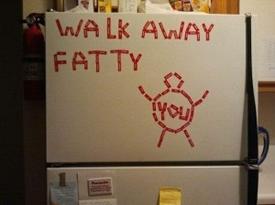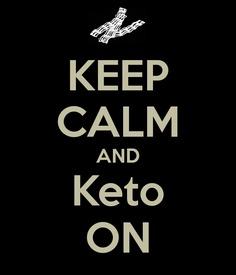too much protein
Replies
-
@Dragonwolf -
Many thanks! I may have a few follow-up questions for you...
(FYI, I did fire my recalcitrant endo and had a good initial visit with a new one, who promptly went on leave and may not return. The hunt resumes.... I test my BG at least 5x/day, but the ketone strips are pricey. Seems unlikely insurance will cover even part of the cost, but it's worth asking.)1 -
authorwriter wrote: »FYI, if you're on the weight-loss diet (as opposed to maintenance), you don't need to hit a magic number of fat calories - your body will merrily chew away on body fat if it doesn't get enough in your diet!
Okay, I just experienced a total disconnect. If this is the case...why are we eating fat at all? wouldn't it be better to eat as little fat as possible, hit our protein goals and let our bodies go to our fat stores?
That's a good question.
If your goal is to burn fat and reduce (as opposed to maintain) your body fat stores, then I think you're basically right. Most of us can't stand reducing our total food intake so drastically, but many LCHF advocates would say there's no reason not to do what you suggest, assuming you meet your macro- and micronutrient requirements (and you're not driven to Twinkies as you keto-adapt).
Anyone else want to chime in?
Dr Bernstein's diet and Dr. Tran Tien Chanh's Ideal Protein diet do this. Yes, it works to use your own fat reserves while sparing muscle due to moderate protein intake, and after getting into ketosis, you aren't that hungry anyhow. The calories are very low (under 1000) for the 1st weight loss phase of IP then there are two other phases that up the fats and a bit of carbs until maintenance, when it is suggested that you are better off upping healthy fats than carbs until you reach stasis. I know several people who have healthily lost over 100lbs this way and have kept it off by eating a LCHF way just as suggested for the maintenance phase of these diets. They have healed their bodies from the usual problems of higher carb lifestyles such as T2 diabetes, PCOS, arthritis, etc. These diets also suggest supplements to be certain you are covering all your bases while in the weight loss phase. Four cups of lower carb veggies must be eaten every day on IP along with a measured amount of salt, and EVOO or coconut oil.
1 -
samanthaluangphixay wrote: »Offal is offal-y delicious.
I love tripe and cow tongue!
I definitely came from a culture that you did not waste parts of the animal. If you could eat it, they found a way.
omg I love tripe and cow tongue! super delicious in tacos not a fan of liver though
not a fan of liver though 
I hate tripe - it reeks when being cooked. I do like tongue though ( @RalfLott no jokes here!).
And because I know what the functions of kidneys and liver are in a body I wouldn't touch them with a ten foot pole...
nothing like eating a poison filter....
2 -
Oh I love liver! I make a mean homemade liver pate and my calf liver with sautéed mushrooms and onions served with crispy bacon is to die for. Liver just tastes so good if it is cooked right.0
-
canadjineh wrote: »I hate tripe - it reeks when being cooked. I do like tongue though ( @RalfLott no jokes here!).
And because I know what the functions of kidneys and liver are in a body I wouldn't touch them with a ten foot pole...
nothing like eating a poison filter....
Damn. Busted before I even set foot in the place.....
I lived in a little place in Europe for a while and got to try "treats" like spleen-and-pancrease sausage. Now that sucker really stank up the place. whew!
2 -
KETOGENICGURL wrote: »SPAM is considered as quality meat? Or emergency food only? I thought "processed" meats like hot dogs were avoided... do LC'ers consider SPAM a good choice?
My only exposure was as a child when cans of it were given to poor coal mining families under the welfare/food program in rural PA (along with those long boxes of processed cheese!)
I doubt anyone would call it "quality" meat. It is meat, and fine to eat. I eat sausage and hotdogs every week, would eat more bacon if I didnt hate cooking it (I know, I know-leave me alone!) and love liverwurst. I'd eat spam if I thought of it in the store...mmm . The kind of sausage and dogs I buy are regular grocery store brand, mass produced. I'd love to buy fresh from a farmer ground sausage, but Im in a farm desert/metropolitan area where my nearest farm is an hour or more away wit no traffic...and there is always traffic. So, grocery store meat, here I come!
. The kind of sausage and dogs I buy are regular grocery store brand, mass produced. I'd love to buy fresh from a farmer ground sausage, but Im in a farm desert/metropolitan area where my nearest farm is an hour or more away wit no traffic...and there is always traffic. So, grocery store meat, here I come!
I do watch the carbs in "processed meats" though. The last hot dogs I bought had 2 each!2 -
@Kirstie155 have you tried baking it in the oven on a cookie sheet? It gets crispy and you can do multiple batches at once. 400F for 13 mins does it for me.0
-
Majcolorado wrote: »For me, the best thing I did was get a DEXA scan and RMR test done, so I know precisely, without the need to guess, what my body comp was on the date of the test and precisely how many calories I burn with zero activity during the day.
I really want to get one of these done since I started weightlifting recently! I cant figure out where I can get one though...
@samanthaluangphixay I have cooked it on one of those plates in the microwave, in a cast iron pan (too much babysitting) and in the oven. I suppose the oven is the best way to do it...
If I am being honest though, the real reason I don't cook bacon is the salty, crispy, delicious cooked bacon never lasts the day. My husband eats it out of the container as I cook it, and munches on it as he drives by the kitchen, ending the day with me slaving over cooking the damn bacon, and him eating it ALL. Too much work, too little reward. None left for my eggs in the morning
So I dont cook it. I tell him he has to cook it. When he does, same results.0 -
authorwriter wrote: »FYI, if you're on the weight-loss diet (as opposed to maintenance), you don't need to hit a magic number of fat calories - your body will merrily chew away on body fat if it doesn't get enough in your diet!
Okay, I just experienced a total disconnect. If this is the case...why are we eating fat at all? wouldn't it be better to eat as little fat as possible, hit our protein goals and let our bodies go to our fat stores?
Fats are considered essential nutrients, as is protein. There are two fats, linoleic and alpha-linolenic, that you need, can't synthesize, and can only get from your diet. I don't know what the daily minimum requirement for fats is, because I'm sure that I exceed it on a daily basis.
However, I do restrict my fat intake, even on my high fat diet. I love fat, and if I don't watch it, I can easily go way over my TDEE.1 -
Question on this: How much protein should one eat per meal to not go over the "too much protein turn in to glucose" point. I heard it was about 30-40 grams. how can I know or tell?0
-
rugged1529 wrote: »Question on this: How much protein should one eat per meal to not go over the "too much protein turn in to glucose" point. I heard it was about 30-40 grams. how can I know or tell?
I keep hearing contradictory things on excess protein, but your numbers seem about right.
The only way to check I can think of would be to try to hold other variables as constant as you possibly can (hard to do, which is what makes n=1 experiments so challenging), and check your blood glucose before, then 60,90,120,and 180 minutes after an identical meal with increasing amounts of protein (perhaps in 5g increments) as the only variable.
@cstehansen, any thoughts?0 -
rugged1529 wrote: »Question on this: How much protein should one eat per meal to not go over the "too much protein turn in to glucose" point. I heard it was about 30-40 grams. how can I know or tell?
I keep hearing contradictory things on excess protein, but your numbers seem about right.
The only way to check I can think of would be to try to hold other variables as constant as you possibly can (hard to do, which is what makes n=1 experiments so challenging), and check your blood glucose before, then 60,90,120,and 180 minutes after an identical meal with increasing amounts of protein (perhaps in 5g increments) as the only variable.
@cstehansen, any thoughts?
I agree with the thoughts on the n=1. The only change is you may need to track a little further out as the GNG is slower. The way I understand it is it won't necessarily cause a spike at any point, it will just prevent you from getting back to your pre-meal BG level as soon. Ideally, you want to be at that level by the 2 hour mark. If the protein is being converted, you will see your BG level remain a bit higher for a while after that, possibly until hour 4 or longer.
I was reading an article a couple months ago that I should have saved because it was debunking some of the myths around only being able to digest a set amount of protein per meal. The myth is you have to stay below 30g per meal. That number comes up because in the SAD diet, no one goes longer than 4-5 hours without eating and your body processes up to about 7g of protein an hour. Therefore the 30g comes up to roughly what can get processed in that time.
However with this WOE, the 4-5 hours between eating is generally not applicable because we can actually make it without 3 snacks a day without gnawing off a finger from the hunger. Also, it is is not like your body just stops processing the protein after 4-5 hours and says, "sorry, time's up." This slow processing of the protein is why there is not a spike but rather a longer slight elevation if you are over-consuming protein. As a point of reference, a BG of 100 means you have 5 g of glucose in your blood, so getting up to 125 is only adding a 6th gram.
Although, you do need protein, the most recent research seems to show that most of what is broken down each day that needs to be replaced ends up being recycled, so you need less than we used to think.
We lose and therefore need to replace somewhere between 0.6 and 0.8 g per kg of lean body mass, which is not very much. This is for a completely sedentary person. If you are trying to build muscle, you will need more.
The question become how much more if you are active. This is where you really have to do some kind of n=1 experimentation. Dr Naly on Keto Talk with Jimmy and the Doc talks about being so IR that getting more than a very moderate amount of protein will kick him out of ketosis. I haven't heard him give specific numbers, but based on some of his comments, it sounds like he is using the 0.8 g/kg of lean mass or very close to it.
It will not cause you harm to go that low for the short term to see how your body reacts. From my experience, it takes at least a week for most of my experiments to show usable results, so I would suggest starting here and track results for as many meals as you can. Then increase a set amount for the next week and track again.
As @RalfLott mentioned, controlling other variables is difficult. This is part of the reason I prefer longer periods like this and would never use just one meal (anymore) for my experiment.2 -
In my opinion upon weighing the pros and cons of eating higher protein assuming the protein = cake theory is true, which honestly varies widely, it's much better to err on the side of higher protein and possibly slower weight loss.
If you're not diabetic or moderate to severely insulin resistant, I think it makes more sense to keep protein up.
Time and time again this is what I see in different groups I read when people follow too low protein for the benefit of faster weight loss. I blocked out the OP, but not the group or Mike Julian because he's an admin and I don't think he'd care since he posts publicly all the time.
Anyway, reading in different groups I often see posts where people try to determine their body fat from the navy calculator and comparison photos and that info and their scales don't ever seem to fit. More often than not, people seem to be registering a higher bodyfat than they expect when they finally get a dexa or measured by calipers. More of us probably got started on the idea of lower protein than didn't and I can't help but think that's the cause of all the surprising dexa scans I'm always seeing people posting.
Sacrificing muscle for faster scale weight loss just isn't a good idea.
If you're truly concerned about proteins affect, you'd get your best answers by testing blood ketones. But unless you're trying to heal at least moderate insulin resistance, that's probably just an unnecessary detail to worry about.
2 -
Gallowmere1984 wrote: »Majcolorado wrote: »Gallowmere1984 wrote: »And if you're concerned about it, there's always Spam. Quick, easy, and the most fat to protein I've ever seen in something that wasn't just oil or a tree nut.

And it's gluten free!
Also a buttload of sodium that we need. Forgot to mention that part.
So it is the PERFECT food! Might have to go over to Hawaii and reintroduce myself to Spam 1
1 -
Or reintroduce yourself to Monty Python, @retirehappy.
 1
1 -
Sunny_Bunny_ wrote: »In my opinion upon weighing the pros and cons of eating higher protein assuming the protein = cake theory is true, which honestly varies widely, it's much better to err on the side of higher protein and possibly slower weight loss.
If you're not diabetic or moderate to severely insulin resistant, I think it makes more sense to keep protein up.
Time and time again this is what I see in different groups I read when people follow too low protein for the benefit of faster weight loss. I blocked out the OP, but not the group or Mike Julian because he's an admin and I don't think he'd care since he posts publicly all the time.
Anyway, reading in different groups I often see posts where people try to determine their body fat from the navy calculator and comparison photos and that info and their scales don't ever seem to fit. More often than not, people seem to be registering a higher bodyfat than they expect when they finally get a dexa or measured by calipers. More of us probably got started on the idea of lower protein than didn't and I can't help but think that's the cause of all the surprising dexa scans I'm always seeing people posting.
Sacrificing muscle for faster scale weight loss just isn't a good idea.
If you're truly concerned about proteins affect, you'd get your best answers by testing blood ketones. But unless you're trying to heal at least moderate insulin resistance, that's probably just an unnecessary detail to worry about.
This, just all of this. It's what I've been trying to scream at people forever. If a purple pee stick is worth losing a bunch of lean mass to someone, I don't even know what to say.
Nevermind the fact that GNG and oxidation are not the same thing, why in all of hell would someone want to just end up being a slightly shrunken mirror image of their current fat self even if it were? I have never met a person who's idea of "lose weight" included a buttload of lean tissue; no, they want fat off. However, keeping protein levels absurdly low is a good way to clip your wings as you go.2 -
Got it! So I should be more concerned about losing lean muscle mass and eating too much protein.0
-
rugged1529 wrote: »Got it! So I should be more concerned about losing lean muscle mass and eating too much protein.
You really don't need to be worried about eating too much unless you're insulin resistant, diabetic or needing to achieve higher ketones on a medically therapeutic application of keto diet.
It's all about context.3 -
@Sunny_Bunny_ it's quite possible that I may be insulin resistant. Even though my IR level was about 8, my blood glucose level was 5.7. Last time it was 5.9 which was a little over a year agao. I started Keto end of January and had my physical end of Feb, plus my weight loss is slow IMO.0
-
First, I will admit that I am late to this party and only skimmed my way through to this point. Second I had never heard of moderating protein until I found Diet Doctor. After several good runs at LCHF that eventually stalled and resulted in derailment (which I now attribute in part to gluconeogenesis) I discovered that in my extreme state of insulin resistance if I eat more than 80 grams of protein a day my ketone levels would drop and my weight loss would slow. I experimented over a few months in 2016 and found that 60-70 grams a day was my sweet spot for optimal ketosis. I am a very big guy, and clearly obese, but with above average lean body mass. Now I am intermittent fasting and ending each fast with a moderate protein meal of around 40 grams of protein. I rarely experience hunger or cravings and have good steady energy throughout the day. Plus I am burning off the belly at a pretty solid rate.2
-
rugged1529 wrote: »@Sunny_Bunny_ it's quite possible that I may be insulin resistant. Even though my IR level was about 8, my blood glucose level was 5.7. Last time it was 5.9 which was a little over a year agao. I started Keto end of January and had my physical end of Feb, plus my weight loss is slow IMO.
Ok. Then if I were you, I would be aware but still cautious about getting enough.
Eating very low may very well result in higher ketones and faster weight loss and even faster correction of the insulin resistance, but there IS still a cost.
If it were me, I would be willing to risk more (as compared to my current way) lean mass loss to correct the other issues but only to a degree. I wouldn't do it just for scale weight loss. That's ludicrous! It just lowers your bmr to lose too much muscle. Making long term maintenance more tricky. Or making resistance training absolutely necessary at some point.
0 -
@Sunny
Yea, I'm at the gym now getting it in. Now you mean eating low calorie wise or protein wise...Just making sure.Sunny_Bunny_ wrote: »rugged1529 wrote: »@Sunny_Bunny_ it's quite possible that I may be insulin resistant. Even though my IR level was about 8, my blood glucose level was 5.7. Last time it was 5.9 which was a little over a year agao. I started Keto end of January and had my physical end of Feb, plus my weight loss is slow IMO.
Ok. Then if I were you, I would be aware but still cautious about getting enough.
Eating very low may very well result in higher ketones and faster weight loss and even faster correction of the insulin resistance, but there IS still a cost.
If it were me, I would be willing to risk more (as compared to my current way) lean mass loss to correct the other issues but only to a degree. I wouldn't do it just for scale weight loss. That's ludicrous! It just lowers your bmr to lose too much muscle. Making long term maintenance more tricky. Or making resistance training absolutely necessary at some point.0 -
rugged1529 wrote: »@Sunny
Yea, I'm at the gym now getting it in. Now you mean eating low calorie wise or protein wise...Just making sure.Sunny_Bunny_ wrote: »rugged1529 wrote: »@Sunny_Bunny_ it's quite possible that I may be insulin resistant. Even though my IR level was about 8, my blood glucose level was 5.7. Last time it was 5.9 which was a little over a year agao. I started Keto end of January and had my physical end of Feb, plus my weight loss is slow IMO.
Ok. Then if I were you, I would be aware but still cautious about getting enough.
Eating very low may very well result in higher ketones and faster weight loss and even faster correction of the insulin resistance, but there IS still a cost.
If it were me, I would be willing to risk more (as compared to my current way) lean mass loss to correct the other issues but only to a degree. I wouldn't do it just for scale weight loss. That's ludicrous! It just lowers your bmr to lose too much muscle. Making long term maintenance more tricky. Or making resistance training absolutely necessary at some point.
Just talking protein.
You definitely have reason to be wary of too much, but there's still that potential for muscle wasting.
You've got a delicate teeter-totter to balance I think.
You might get some really good tips in the Ketogains Facebook group from others in the same boat.
Your plan to IF sounds good too. It seems some fasting makes such a big impact on the IR. I can't imagine why anyone wouldn't be using that tool if reversing IR is a goal.
I think you're on the right track and hope to hear some great updates as you progress.2
This discussion has been closed.











